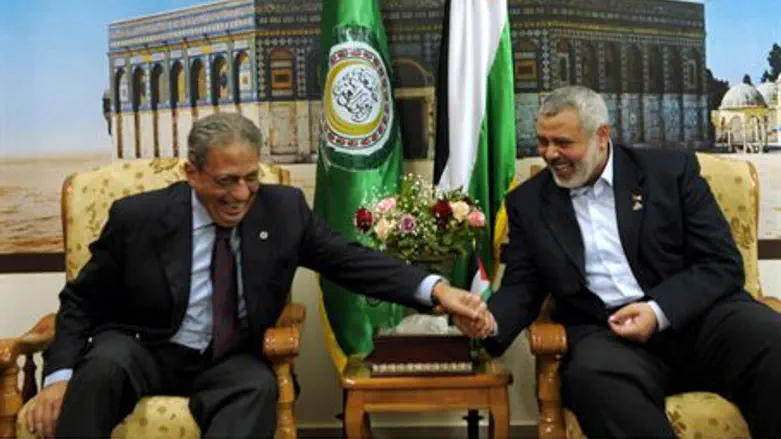
Fatah and Hamas are apparently still far from a reconciliation deal, despite Fatah's latest offer to allow the Gaza-based terrorist organization to avoid the requirement of having to formally recognize the State of Israel.
Furthermore, Fatah did not insist that Hamas meet the three conditions for resumption of funding set by the international Quartet of nations, according to a report published Wednesday by the Jordanian daily newspaper Ad-Dustur.
“We want the government to commit to the PLO's program and [Hamas de facto Prime Minister Ismail] Haniyeh to commit to a unity and prisoner swap deal, with negotiations carried out by the PLO,” Fatah Central Committee member Nabil Sha'ath told the newspaper. “We did not ask for more than that.”
Sha'ath's comments came as an apparent clarification after Hamas rejected another attempt by Fatah to jump start reconciliation talks with its rival Palestinian Authority faction by offering to send a delegation to Gaza.
Fatah, headed by PA Chairman Mahmoud Abbas, comprises the largest faction in the Palestine Liberation Organization (PLO), which is also headed by Abbas. Hamas has never been a member of the pan-Palestinian body, however, despite having taken nearly two-thirds of the mandates in the PA's 2006 legislative council elections.
Arab League Secretary-General Amr Moussa also visited Gaza this week in what was billed as his first trip ever to the region, intended to encourage Hamas to agree to talks with Fatah. Fatah's leaders were disturbed about this was a step towards recognition of the PA's bitter rival for power. The attempt to get an agreement for talks failed, however, earning the terrorist organization bitter criticism in an editorial posted by the PA Ramallah-based Palestine News Network.
“As usual, the Hamas movement thought that world sympathy is with the movement and not with the people of Gaza as human beings,” wrote PNN Director Fadi Abu Sada. “Therefore it insisted its increase and demands for a national reconciliation to take place...Hamas, you are the ones who need the support of the international community, and not vice versa.”
Meanwhile, according to the Bethlehem-based Ma'an news agency, former U.S. President Jimmy Carter is expected to arrive in the region for a visit on June 23. The PA-linked news agency reported that Carter is expected to pressure Israel into ending its partial blockade of Gaza -- an issue that Carter has discussed with Israel numerous times before.
Sha'ath also said he is continuing his efforts to petition Cairo to allow the transfer of goods into Gaza through the Rafiah Crossing, which straddles the border between Egypt and Gaza. Although Cairo has allowed a flood of Gazans through the terminal in recent days, Sha'ath complained that it was “only opened for the transit of residents.”
Tens of thousands of tons of humanitarian aid and more than a million liters of fuel are transferred to the region each month in daily deliveries to Gaza through the four land-based crossing with Israel: Kerem Shalom, Karni, Nahal Oz and Erez.
In addition, medical patients and their escorts regularly make their way in and out of the region through the crossings to obtain treatment in various facilities in Israel, including places in Judea and Samaria; hundreds of international aid employees travel in and out of the region the same way. Israel is talking about easing whatever restrictions remain.